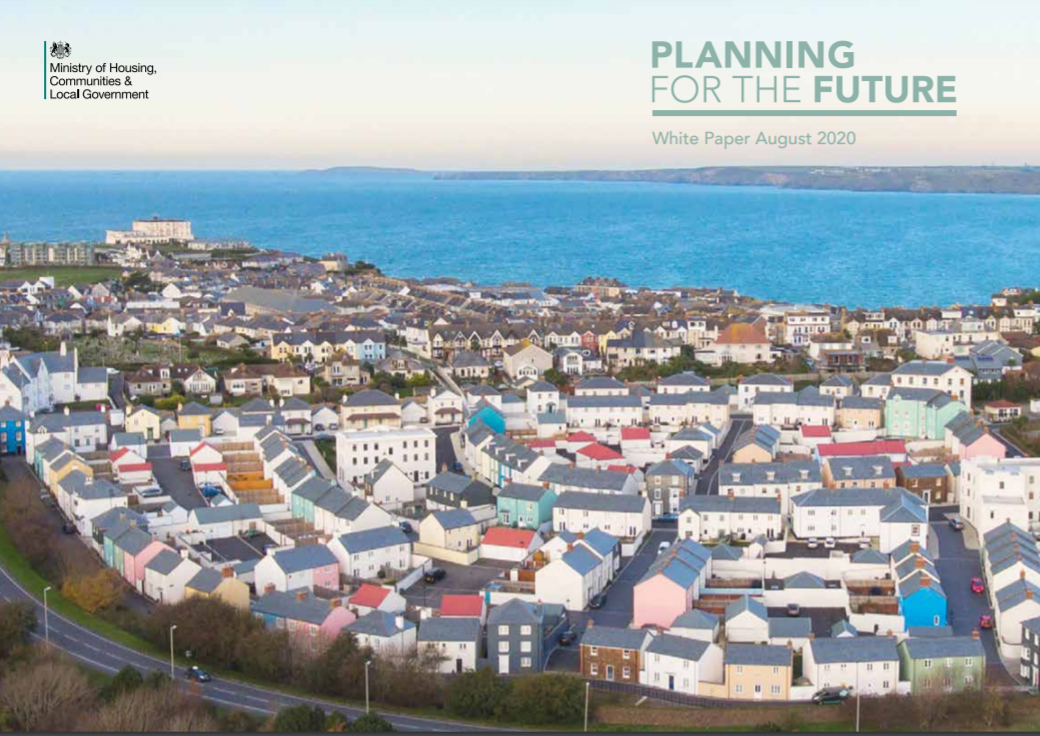Planning for the future
On 6 August 2020, the government published a consultation on reforms to the planning system. The proposals are intended to streamline the process, cut red tape, harness technology and protect green space to deliver high-quality, sustainable communities.
The white paper, Planning for the future, developed with advice from the Planning Taskforce, focusses on local community agreement, with communities consulted from the very beginning of the planning process.
Land will be designated into one of three categories decided through local consensus:
- Land suitable for growth will be approved at the same time that plans are prepared, meaning developments can be built quickly, as long as local design standards are met.
- Renewal areas will enable much quicker development where those developments are well designed in a way which reflects community preferences.
- Development on green belt land will continue to be restricted, with policy remaining a decision for local authorities.
Other proposed changes include;
- Overhauling the existing planning process and replacing it with a clearer, rules based system.
- Section 106 agreements and the Community Infrastructure Levy will be replaced with a new Infrastructure Levy that will be a fixed proportion of the value of the development, above a set threshold.
- Establishing local design guidance for developers to build and preserve beautiful communities.
- Making all new homes ‘zero carbon ready’, with no new homes needing to be retrofitted.
- Allowing for more building on brownfield land.
- Making all new streets tree lined.
- A First Homes scheme to provide newly-built homes at a 30% discount for local people, key workers and first-time buyers.
- Harnessing technology through online maps and data, to make the whole system more accessible.
- Make the housing industry more diverse by supporting SMEs and self-builders.
Housing Secretary Rt Hon Robert Jenrick MP said: “Our complex planning system has been a barrier to building the homes people need; it takes 7 years to agree local housing plans and 5 years just to get a spade in the ground. These once in a generation reforms will lay the foundations for a brighter future, providing more homes for young people and creating better quality neighbourhoods and homes across the country. We will cut red tape, but not standards, placing a higher regard on quality, design and the environment than ever before. Planning decisions will be simple and transparent, with local democracy at the heart of the process.”
Victoria Hills, chief executive of the Royal Town Planning Institute (RTPI), said: “The RTPI will judge the success of these reforms on how successfully they tackle inequality, accelerate progress to net-zero carbon emissions, promote sustainable transport and answer the need for strategic planning. It is, however, extremely encouraging to see recognition in the proposals of the importance of a local plan, quality design, community engagement and a plan-led approach."
Eddie Tuttle, director of policy, research and public affairs at the CIOB, said: “The white paper published today highlights the need for reform of the planning system in order to build the homes we desperately need. But we are concerned the government’s focus on extending permitted development rights, including the ability to demolish and rebuild commercial and residential buildings on existing sites without a full planning —if implemented without significant safeguards—will lock in more unacceptable standard development, the consequences of which we will live with for generations or must rectify later at greater expense.”
The full consultation document is available at: www.gov.uk/government/consultations/planning-for-the-future
[edit] Related articles on Designing Buildings Wiki
Featured articles and news
The first line of defence against rain, wind and snow.
Building Safety recap January, 2026
What we missed at the end of last year, and at the start of this...
National Apprenticeship Week 2026, 9-15 Feb
Shining a light on the positive impacts for businesses, their apprentices and the wider economy alike.
Applications and benefits of acoustic flooring
From commercial to retail.
From solid to sprung and ribbed to raised.
Strengthening industry collaboration in Hong Kong
Hong Kong Institute of Construction and The Chartered Institute of Building sign Memorandum of Understanding.
A detailed description from the experts at Cornish Lime.
IHBC planning for growth with corporate plan development
Grow with the Institute by volunteering and CP25 consultation.
Connecting ambition and action for designers and specifiers.
Electrical skills gap deepens as apprenticeship starts fall despite surging demand says ECA.
Built environment bodies deepen joint action on EDI
B.E.Inclusive initiative agree next phase of joint equity, diversity and inclusion (EDI) action plan.
Recognising culture as key to sustainable economic growth
Creative UK Provocation paper: Culture as Growth Infrastructure.
Futurebuild and UK Construction Week London Unite
Creating the UK’s Built Environment Super Event and over 25 other key partnerships.
Welsh and Scottish 2026 elections
Manifestos for the built environment for upcoming same May day elections.
Advancing BIM education with a competency framework
“We don’t need people who can just draw in 3D. We need people who can think in data.”





















